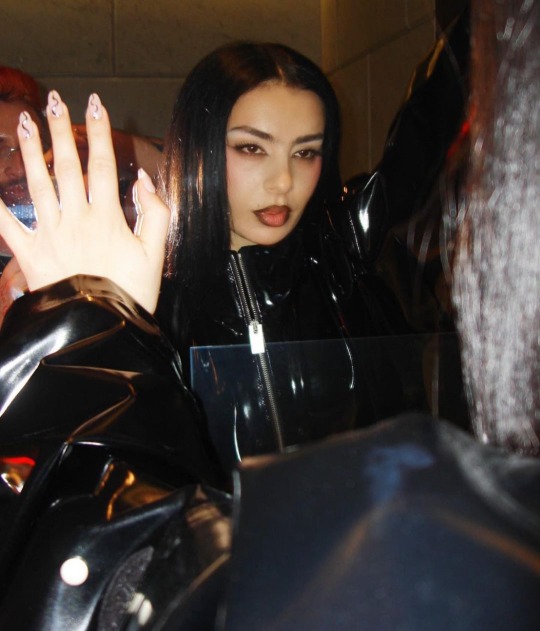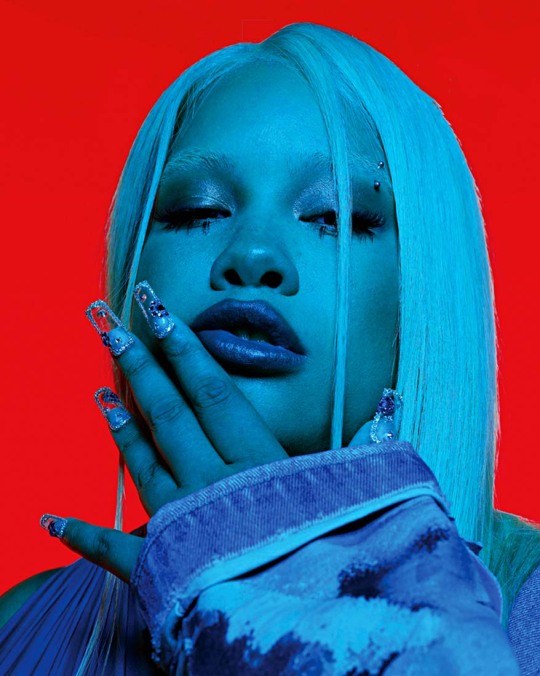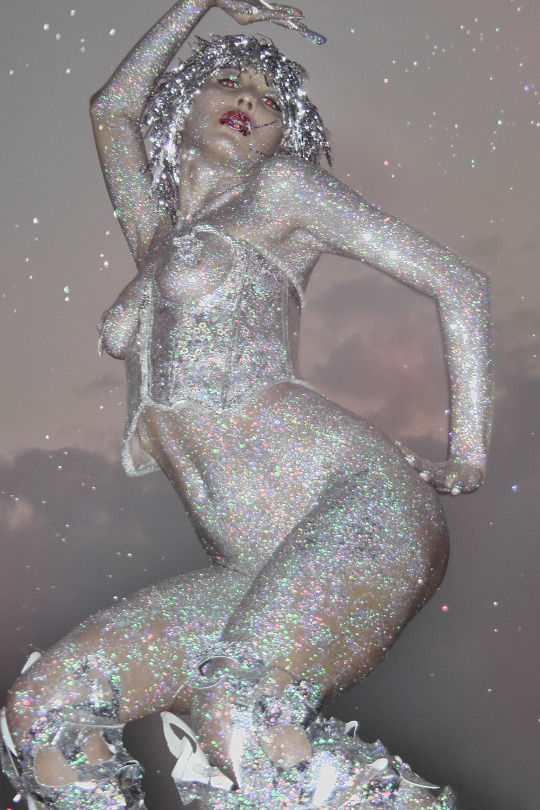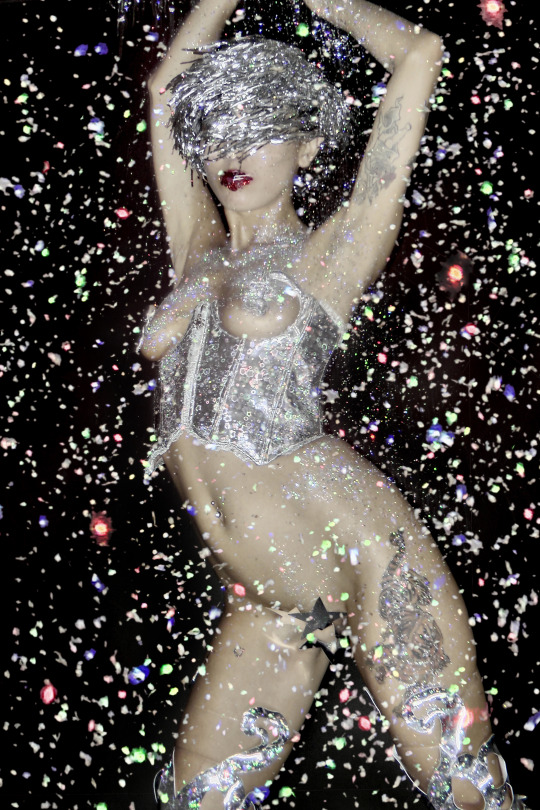#samuel ibram
Explore tagged Tumblr posts
Text




charli xcx by samuel ibram for moncler genius show, makeup by alice dodds
2K notes
·
View notes
Text




CHARLI XCX: moncler genius show (2023) | 📷: Samuel Ibram
27 notes
·
View notes
Photo






SHYGIRL x NYLON FRANCE ph. Samuel Ibram
#shygirl#dailywoc#dailywomen#popularcultures#usermusic#femalestunning#*medits#*m#always a fan of the red on blue combo..#so sick
500 notes
·
View notes
Text

N° 37 | SHYGIRL | NYLON France cover story
Journalist : Lucas Dias Photographer : Samuel Ibram Photography assistant : Mark Griffiths Creative director : Mischa Notcutt Stylist : Matthew Josephs @ Mini Title Styling assistant : Natalie Moutrey Make-up artist : Luz Giraldo Hair stylist : Shy Mason Set designer : Ranya El Refaey Assistant set designer : Felix Villiers Production : YMI Studio Production assistant : Kennedy Clark
0 notes
Text

Exhibicionista Isabella Pt. II
44 notes
·
View notes
Photo

SHYGIRL by Samuel Ibram for JaLOUSe Magazine (2021)
2K notes
·
View notes
Photo

Sega Bodega by Samuel Ibram, 2020
43 notes
·
View notes
Text
books I’ve read in 2020 (so far) + their ratings
(update books 60-70) / 7.10.20
non-fiction
crossing the line: australia’s secret history in the timor sea by kim mcgrath
hood feminism: notes from the women that a movement forgot by mikki kendall
the uninhabitable earth: life after warming by david wallace-wells
homo deus: a brief history of tomorrow by yuval noah harari
SPQR: a history of ancient rome by mary beard
sister outsider by audre lorde
all boys aren’t blue by george m. johnson
under a biliari tree i born by alice biari smith
the lost world of british communism by raphael samuel
the ethnic cleansing of palestine by ilan pappé
stamped from the beginning: the definitive history of racist ideas in America by ibram x. kendi
catch and kill: lies, spies and a conspiracy to protect predators by ronan farrow
classics
maurice by e.m forster
emma by jane austen
perfume by patrick suskind
the color purple by alice walker
a study in scarlet by arthur conan doyle
dracula by bram stoker
the tenant of wildfell hall by anne bronte
fantasy
the diviners by libba bray (reread)
lair of dreams by libba bray (reread)
before the devil breaks you by libba bray (reread)
the king of crows by libba bray
clockwork princess by cassandra clare (reread)
we unleash the merciless storm by tehlor kay mejia
wolfsong by t.j klune
the fate of the tearling by erika johansan
girl, serpent, thorn by melissa bashardoust
crier’s war by nina varela (reread)
we hunt the flame by hafsah faizal
ghosts of the shadow market by cassandra clare + others
a storm of swords: part two by george r.r martin
amarah by l.l mcneil
chain of gold by cassandra clare
the gilded wolves by roshani chokshi (reread)
the silvered serpents by roshani chokshi
girls of storm and shadow by natasha ngan
science fiction
This is How You Lose the Time War by Amal El-Mohtar and Max Gladstone
not your sidekick by c.b lee
the martian by andy weir
speculative fiction:
the deep by rivers solomon
how long ‘til black future month? by n.k jemisin
terra nullius by claire g. coleman
magical realism
blanca & roja by anna-marie mclemore
mystery
the family upstairs by lisa jewell
the hand on the wall by maureen johnson
the lake house by kate morton
contemporary fiction
maybe in another life by taylor jenkins reid
girl, woman, other by bernadine evaristo
tin heart by shivan plozza
a little life by hanya yanigahara
a girl like that by tanaz bhathena
little fires everywhere by celeste ng
stay gold by tobly mcsmith
everything leads to you by nina lacour
the falling in love montage by ciara smyth
normal people by sally rooney
the glass hotel by emily st john mandel
only mostly devastated by sophie gonzales
historical fiction
half of a yellow sun by chimamanda ngozi adichie
hamnet by maggie o’farrell
all the light we cannot see by anthony doerr
romance:
get a life, chloe brown by talia hibbert
poetry:
on earth we’re briefly gorgeous by ocean vuong
clap when you land by elizabeth acevedo
translated fiction:
princess bari by hwang sok-yong (south korean)
graphic novels:
laura dean keeps breaking up with me by mariko tamaki and rosemary valero-o'connell (illustrations)
anthology:
meet me at the intersection edited by rebecca lim and ambelin kwaymullina
9 notes
·
View notes
Text
I want to revisit the topic of compassion fatigue.
There is a popular notion that there is very little that your average white person can do to help Black Lives Matter, and that as such, it is not worth thinking too much about it. After all, why worry about what you cannot change, if it will only stress you out?
As a white person in America, you have the ability to opt out of talking about Black Lives Matter. This is expected of you. What is right of you to do is not to let yourself complacently ignore the suffering of Black Americans.
That being said, you do not have to put yourself at the forefront of the movement. You do not have to spend 100% of your time working to dismantle the American police force. Not only will you burn yourself out in no time, there is every chance that you will only make things worse. You do not have to go to every protest and fling yourself onto every police officer. Not only will you only make things worse for the Black protesters, who do not have the same shield you do, you will not help the perception of the protesters, and you will not help the cause. You do not have to shout at your loved ones at the dinner table every moment of every day. Not only will you not change their minds, you will very likely put yourself in danger for nothing.
But you cannot stay silent.
If you can go to a protest, then do. Recognise the protection that your whiteness gives you, and do not risk the safety of the Black people beside you. Research how you can keep others safe.
If you can donate to organisations that help Black people get out of jail, pay legal fees, etc., then do. Make sure that your money is going to a legitimate organisation.
While doing the above, and especially if you cannot do the above, you must educate yourself. White people do not have the inherent knowledge of being Black in America. We do not face the same struggles. We do not know better than Black people. Look into books on race written by Black authors (So You Want to Talk About Race by Ijeoma Oluo; How to be an Antiracist by Ibram X. Kendi; Fatal Invention: How Science, Politics, and Big Business Re-Create Race in the Twenty-First Century by Dorothy Roberts; The Fire Next Time by James Baldwin, etc.). Look into documentaries produced by Black people (13th dir. Ava DuVernay; The African Americans: Many Rivers to Cross by Henry Louis Gates, Jr.; Slavery By Another Name dir. Samuel D. Pollard, etc.). Additionally, look into resources specifically about becoming antiracist as a white person - I recommend Jane Elliott’s work, as well as White Fragility by Robin DiAngelo.
Furthermore, approaching the Black Lives Matter movement as a way to fulfil your masturbatory idea of becoming a selfless martyr feeds into the white saviour idea and places the focus of activism onto white people. White guilt helps nothing, and the idea that the only acceptable way to help Black people is by making a big show of dying for them is incorrect. You’ll support others better alive than dead.
You as a white person do not have to spend every moment of every day thinking about the treatment of Black people in America. Recognise this, and spend time every day trying to unlearn white supremacist ideas. Spend time reading the news, and assisting others however you can - ask your Black loved ones how you can help them. If you are feeling compassion fatigue, imagine how tired they are. If they ask for you to shut up and listen, then shut up and listen. If they ask to be left alone, leave them alone. Their safety and wellbeing is more important than your comfort.
You are not as helpless as you think you are, and you have a job to do.
#black lives matter#all lives dont matter until black lives do#blm protests#george floyd#minneapolis protest#long post
4 notes
·
View notes
Text
Research Masterpost
This is my research list for The Alt-Right Playbook. It is a living document - I am typically adding sources faster than I am finishing the ones already on it. Notes and links below the list. Also, please note this does not include the hundreds of articles and essays I’ve read that also inform the videos - this is books, reports, and a few documentaries.
Legend: Titles in bold -> finished Titles in italics -> partially finished *** -> livetweeted as part of #IanLivetweetsHisResearch (asterisks will be a link) The book I am currently reading will be marked as such.
Media Manipulation & Disinformation Online, by Alice Marwick and Rebecca Lewis Alternative Influence, by Rebecca Lewis The Authoritarians, by Bob Altemeyer*** Eclipse of Reason, by Max Horkheimer Civility in the Digital Age, by Andrea Weckerle The Origins of Totalitarianism, by Hannah Arendt On Revolution, by Hannah Arendt Don’t Think of an Elephant, by George Lakoff The Shock Doctrine, by Naomi Klein How Propaganda Works, by Jason Stanley*** This is an Uprising, by Mark and Paul Engler Neoreaction a Basilisk, by Elizabeth Sandifer This Nonviolent Stuff'll Get You Killed, by Charles E. Cobb, Jr. Mistakes Were Made (But Not By Me), by Carol Tavris and Elliot Aronson Healing from Hate, by Michael Kimmel The Brainwashing of my Dad, doc by Jen Senko On Bullshit, by Harry Frankfurt The Reactionary Mind, by Corey Robin*** Stamped from the Beginning, Ibram X. Kendi Fascism Today, by Shane Burley Indoctrination over Objectivity?, by Marrissa S. Ballard Ur-Fascism, by Umberto Eco Adult Children of Emotionally Immature Parents, by Lindsay C. Gibson Anti-Semite and Jew, by Jean-Paul Sartre Alt-America, by David Neiwert*** The Dictator’s Handbook, by Bruce Bueno de Mesquita & Alastair Smith Terror, Love, and Brainwashing, by Alexandra Stein Kaputt, by Curzio Malaparte The Anatomy of Fascism, by Robert O. Paxton Neoliberalism and the Far Right, by Neil Davidson and Richard Saull Trolls Just Want to Have Fun, by Erin E. Buckels, et al The Entrepreneurial State, by Mariana Mazzucato
Media Manipulation & Disinformation Online, by Alice Marwick and Rebecca Lewis (free: link) A monstrously useful report from Data & Society which- coupled with Samuel R. Delany’s memoir The Motion of Light in Water - formed the backbone of the Mainstreaming video. I barely scratched the surface of how many techniques the Far Right uses to inflate their power and influence. If you feel lost in a sea of Al-Right bullshit, this will at least help you understand how things got the way they are, and maybe help you discern truth from twaddle.
The Authoritarians, by Bob Altemeyer (free: link) (livetweets) A free book full of research from Bob Altemeyer’s decades of study into authoritarianism. Altemeyer writes conversationally, even jovially, peppering what could have been a dense and dry work with dad jokes. I wouldn’t say he’s funny (most dads aren’t), but it makes the book blessedly accessible. If you ever wanted a ton of data demonstrating that authoritarianism is deeply correlated with conservatism, this is the book. One of the most useful resources I’ve consumed so far, heavily influencing the entire series but most directly the video on White Fascism. Even has some suggestions for how to actually change the mind of a reactionary, which is kind of the Holy Grail of LeftTube.
(caveats: there is a point in the book where Altemeyer throws a little shade on George Lakoff, and I feel he slightly - though not egregiously - misrepresents Lakoff’s arguments)
Don’t Think of an Elephant, by George Lakoff An extremely useful book about framing. Delves into the differences between the American Right and Left when it comes to messaging, how liberal politicians tend to have degrees in things like Political Science and Rhetoric, where conservatives far more often have degrees in Marketing. This leads to two different cultures, where liberals have Enlightenment-style beliefs that all you need is good ideas and conservatives know an idea will only be popular if you know how to sell it. He gets into the nuts and bolts of how to keep control of a narrative, because the truth is only effective if the audience recognizes it as such. Kind of staggering how many Democrats swear by this book while blatantly taking none of its advice. Lakoff has been all over the series since the first proper video.
(caveats: several. Lakoff seemingly believes the main difference between the Right and Left is in our default frames, and that swaying conservatives amounts to little more than finding better ways to make the same arguments. he deeply underestimates the ideological divide between Parties, and some of his advice reads as tips for making debates more pleasant but no more productive. he also makes a passing comparison between conservatism and Islam that means well but is a gross and kinda racist false equivalence)
How Propaganda Works, by Jason Stanley (livetweets) A slog. Many useful concepts, and directly referenced in the White Fascism video. But could have said everything it needed to say in half as many pages. Stanley seems dedicated to framing everything in epistemological terms, not appealing to morality or sentiment, which means huge sections of the book are given over to “proving” democracy is a good thing using only philosophical concepts, when “democracy good” is probably something his readership already accepts. Also has a frustrating tendency to begin every paragraph with a brief summary of the previous paragraph. When he actually talks about, you know, how propaganda works, it’s very useful, and I don’t regret reading it. But I don’t entirely recommend it. Seems written for an imagined PhD review board. Might be better off reading my livetweets.
Neoreaction a Basilisk, by Elizabeth Sandier A trip. Similar to Jason Stanley, Sandifer is dedicated to “disproving” a number of Far Right ideologies - from transphobia to libertarianism to The Singularity - in purely philosophical terms. The difference is, she’s having fun with it. I won’t pretend the title essay - a 140-page mammoth - didn’t lose me several times, and someone had to remind which of its many threads was the thesis. And some stretches are dense, academic writing punctuated with vulgarity and (actually quite clever) jokes, which doesn’t always average out to the playfully heady tone she’s going for. But, still, frequently brilliant and never less than interesting. There is something genuinely cathartic about a book that begins with the premise that we all fear but won’t let ourselves meaningfully consider - that we will lose the fight with the Right and climate change is going to kill us all - and talks about what we can do in that event. I felt I didn’t even have to agree with the premise to feel strangely empowered by it. Informed the White Fascism video’s comments on transphobia as the next frontier of bigotry since failing to prevent marriage equality.
On Bullshit, by Harry Frankfurt Was surprised to find this isn’t properly a book, just a printed essay. Highly relevant passage that helped form my description of 4chan in The Card Says Moops: “What tends to go on in a bull session is that the participants try out various thoughts and attitudes in order to see how it feels to hear themselves saying such things and in order to discover how others respond, without its being assumed that they are committed to what they say: it is understood by everyone in a bull session that the statements people make do not necessarily reveal what they really believe or how they really feel. The main point is to make possible a high level of candor and an experimental or adventuresome approach to the subjects under discussion. Therefore provision is made for enjoying a certain irresponsibility, so that people will be encouraged to convey what is on their minds without too much anxiety that they will be held to it. [paragraph break] Each of the contributors to a bull session relies, in other words, upon a general recognition that what he expresses or says is not to be understood as being what he means wholeheartedly or believes unequivocally to be true. The purpose of the conversation is not to communicate beliefs.”
The Reactionary Mind, by Corey Robin (livetweets) Another freakishly useful book, and the basis for Always a Bigger Fish and The Origins of Conservatism. Jumping into the history of conservative thought, going all the way back to Thomas Hobbes, to stress that conservatism is, and always has been, about preserving social hierarchies and defending the powerful. Robin dissects thinkers who heavily influenced conservatism, from Edmund Burke and Friedrich Nietzsche to Carl Menger and Ayn Rand, and finally concluding with Trump himself. There’s a lot of insight into how the conservative mind works, though precious little comment on what we can do about it, which somewhat robs the book of a conclusion. Still, the way it bounces off of Don’t Think of an Elephant and The Authoritarians really brings the Right into focus.
Fascism Today, by Shane Burley Yet another influence on the White Fascism video. Bit of a mixed bag. The opening gives a proper definition of fascism, which is extremely useful. Then the main stretch delves into the landscape of modern fascism, from Alt-Right to Alt-Lite to neofolk pagans to the Proud Boys and on and on. Sometimes feels overly comprehensive, but insights abound on the intersections of all these belief systems (Burley pointing out that the Alt-Right is, in essence, the gentrification of working-class white nationalists like neo-Nazi skinheads and the KKK was a real eye-opener). But the full title is Fascism Today: What it is and How to End it, and it feels lacking in the second part. Final stretch mostly lists a bunch of efforts to address fascism that already exist, how they’ve historically been effective, and suggestions for getting involved. Precious few new ideas there. And maybe the truth is that we already have all the tools we need to fight fascism and we simply need to employ them, and being told so is just narratively unsatisfying. Or maybe it’s a structural problem with the book, that it doesn’t reveal a core to fascism the way Altemeyer reveals a core to authoritarianism and Robin reveals a core to conservatism, so I don’t come away feeling like I get fascism well enough to fight it. But, also, Burley makes it clear that modern fascism is a rapidly evolving virus, and being told that old ways are still the best ways isn’t very satisfying. If antifascism isn’t evolving at least as rapidly, it doesn’t seem like we’re going to win.
(caveats: myriad. for one, Burley repeatedly quotes Angela Nagle’s Kill All Normies, which does not inspire confidence. he also talks about “doxxing fascists” as a viable strategy without going into the differences between “linking a name to a face at a public event” and “hacking someone’s email to publicly reveal their bank information,” where the former is the strategy that fights fascism and the latter is vigilantism that is practiced widely on the Right and only by the worst actors on the Left. finally, the one section where Burley discusses an area I had already thoroughly researched was GamerGate, and he got quite a few facts wrong, which makes me question how accurate all the parts I hadn’t researched were. I don’t want to drive anyone away from the book, because it was still quite useful, but I recommend reading it only in concert with a lot of other sources so you don’t get a skewed perspective.)
Healing from Hate, by Michael Kimmel (Michael Kimmel, it turns out, is a scumbag. This book’s main thesis is that we need to look at violent extremism through the lens of toxic masculinity, so Kimmel’s toxic history with women is massively disappointing. Book itself is, in many ways, good, but, you know, retweets are not endorsement.)
A 4-part examination of how men get into violent extremism through the lens of the organizations that help them get out: EXIT in Germany and Sweden, Life After Hate in the US, and The Quilliam Foundation in Europe and North America. Emphasizing that entry into white nationalism - and, to an extent, jihadism - is less ideological than social. Young men enter these movements out of a need for community, purpose, and a place to put their anger. They feel displaced and mistreated by society - and often, very tangibly, are - and extremism offers a way to prove their manhood. Feelings of emasculation is a major theme. The actual politics of extremism are adopted gradually. They are, in a sense, the price of admission for the community and the sense of purpose. The most successful exit strategies are those that address these feelings of loneliness and emasculation and build social networks outside the movement, and not ones that address ideology first - the ideology tends to wither with the change in environment. The book itself can be a bit repetitive, but these observations are very enlightening.
(caveats: the final chapter on militant Islam is deeply flawed. Kimmel clearly didn’t get as much access to Qulliam as he had to EXIT and Life After Hate, so his data is based far less on direct interviews with counselors and former extremists and much more on other people’s research. despite the chapter stressing that a major source of Muslim alienation is racism, Kimmel focuses uncomfortably much on white voices - the majority of researchers he quotes are white Westerners, and the few interviews he manages are mostly with white converts to Islam rather than Arabs or South Asians. all in all, the research feels thinner, and his claims about militant Islam seem much more conjectural when they don’t read as echos of other people’s opinions.)
Terror, Love and Brainwashing, by Alexandra Stein A look at totalitarian governments and cults through the lens of attachment theory. While not explicitly about the Far Right, it’s interesting to see the overlap between this and Healing from Hate. Stein stresses that the control dynamics she discusses are not exclusive to cults, and are, in fact, the same ones as in abusive relationships; cults are just the most extreme version. So you can see many similar dynamics in Far Right organizations, like the Aryan Nations or the Proud Boys. It’s made me curious how many of these dynamics are in play in the distributed, less controlled environment of online extremism, and makes me want to look further into the subject before drawing conclusions.
(caveats: book is, as with How Propaganda Works, sometimes a slog and rather repetitive. I clocked a 4-page stretch in chapter 8 where Stein did not say a single thing that hadn’t been said multiple times in previous chapters. also, when talking about people coerced into highly-controlled lifestyles, she offhandedly includes “prostitutes” among them? it’s that liberal conflation of sex work and trafficking which is really not cool. this isn’t a major point, just something to notice while you read it.)
Alt-America, by David Neiwert (livetweets) A look at the actual formation of the Alt-Right, and the history that led up to it: the Militia and Patriot movements of the 90′s, the Tea Party, the rise of Alex Jones and Glenn Beck, and so on. Having been steeped in the rhetoric and tactics of the Far Right for so long, someone doing the work of sitting down and putting it all in chronological order is immensely helpful. Generally clear and well-written, too, and would be an easy read if not for how goddamn depressing the content is. Has an unfortunate final 7 pages, where Neiwert starts recommending actual policy. Falls into the usual “have empathetic conversations with genuine conservatives to turn them against the fascist wing taking over their party,” not recognizing the ways in which conservatism is continuous with fascism, nor the ways that trying to appeal to moderate conservatives alienates the people whose rights they deny. Means an extremely valuable book leaves a bad taste in the final stretch, but everything up to then is aces.
454 notes
·
View notes
Text
Book List 2018
I’m a couple weeks behind on this, but here’s the list of books I read in 2018. I’ve broken it down by category, though this is pretty loose since, you know, genres bleed into one another and such. You can also find reviews of some of these books here, and I always take requests for reviews as well. Follow me on Goodreads to see what I’m reading and rating.
Let me know what you think if you’ve read any of these books or have recommendations, and, as always, please feel free to send me malicious personal attacks if I say something you disagree with.

Non-Fiction
Philosophy
Pragmatism and Feminism: Reweaving the Social Fabric by Charlene Haddock Seigfried
The Pragmatic Turn by Richard J. Bernstein
Race Matters by Cornel West
Democracy Matters: Winning the Fight Against Imperialism by Cornel West
American Philosophy: A Love Story by John Kaag
Ethics Without Ontology by Hilary Putnam
Meaning in Life and Why It Matters by Susan Wolf
The Variety of Values: Essays on Morality, Meaning, and Love by Susan Wolf
The Really Hard Problem: Meaning in a Material World by Owen J. Flanagan
Meaning in Life by Thaddeus Metz
The Human Eros: Eco-Ontology and the Aesthetics of Existence by Thomas Alexander
Naturalism and Normativity by Mario De Caro (Editor), David Macarthur (Editor)
Truth in Context: An Essay on Pluralism and Objectivity by Michael P. Lynch
Teaching to Transgress: Education as the Practice of Freedom by bell hooks
The Origin of Others by Toni Morrison
Experiments in Ethics by Kwame Anthony Appiah
Ethics in the Real World: 86 Brief Essays on Things that Matter by Peter Singer
The Ethics of Ambiguity by Simone de Beauvoir
A Very Easy Death by Simone de Beauvoir
The Story of Philosophy: The Lives and Opinions of the World's Greatest Philosophers by Will Durant
Why Buddhism is True: The Science and Philosophy of Enlightenment by Robert Wright
A Defense of Buddhist Virtue Ethics by Jack Hamblin
Living Buddha, Living Christ by Thich Nhat Hanh
The Infidel and the Professor: David Hume, Adam Smith, and the Friendship That Shaped Modern Thought by Dennis C. Rasmussen
The Book of Joy: Lasting Happiness in a Changing World by Dalai Lama XIV, Desmond Tutu, and Douglas Carlton Abrams
Reality, Art and Illusion by Alan Watts
Democracy and Social Ethics by Jane Addams
Common Sense by Thomas Paine
From Bacteria to Bach and Back: The Evolution of Minds by Daniel C. Dennett
Science
Behave: The Biology of Humans at Our Best and Worst by Robert Sapolsky
The Rise and Fall of the Dinosaurs: A New History of a Lost World by Stephen Brusatte
Why Dinosaurs Matter by Kenneth Lacovara
I Contain Multitudes: The Microbes Within Us and a Grander View of Life by Ed Yong
The Evolution of Beauty: How Darwin's Forgotten Theory of Mate Choice Shapes the Animal World—And Us by Richard O. Prum
Gulp: Adventures on the Alimentary Canal by Mary Roach
Spook: Science Tackles the Afterlife by Mary Roach
Bonk: The Curious Coupling of Science and Sex by Mary Roach
She Has Her Mother's Laugh: The Powers, Perversions, and Potential of Heredity by Carl Zimmer
Sapiens: A Brief History of Humankind by Yuval Noah Harari
21 Lessons for the 21st Century by Yuval Noah Harari
Caesar's Last Breath: Decoding the Secrets of the Air Around Us by Sam Kean
Why Evolution is True by Jerry Coyne
What Is Real?: The Unfinished Quest for the Meaning of Quantum Physics by Adam Becker
Brief Answers to the Big Questions by Stephen Hawking
Seven Brief Lessons on Physics by Carlo Rovelli
The Physics of Time by Carlo Rovelli
Physics of the Impossible: A Scientific Exploration of the World of Phasers, Force Fields, Teleportation, and Time Travel by Michio Kaku
The Spinning Magnet: The Force That Created the Modern World--and Could Destroy It by Alanna Mitchell
Pale Blue Dot: A Vision of the Human Future in Space by Carl Sagan
Visions for the 21st Century by Carl Sagan et al.
The Emperor of All Maladies: A Biography of Cancer by Siddhartha Mukherjee
What the Dog Saw and Other Adventures by Malcolm Gladwell
The Soul of the Night: An Astronomical Pilgrimage by Chet Raymo
The Virgin and the Mousetrap: Essays in Search of the Soul of Science by Chet Raymo
Politics/Race/Gender
The Will to Change: Men, Masculinity, and Love by bell hooks
Bad Feminist by Roxane Gay
Not That Bad: Dispatches from Rape Culture by Roxane Gay (editor)
Dear Ijeawele, or a Feminist Manifesto in Fifteen Suggestions by Chimamanda Ngozi Adichie
Eloquent Rage: A Black Feminist Discovers Her Superpower by Brittney Cooper
Women & Power: A Manifesto by Mary Beard
The Fire Next Time by James Baldwin
I Am Not Your Negro by James Baldwin
The Origin of Others by Toni Morrison
Just Mercy: A Story of Justice and Redemption by Bryan Stevenson
Race Matters by Cornel West
Democracy Matters: Winning the Fight Against Imperialism by Cornel West
Stamped from the Beginning: The Definitive History of Racist Ideas in America by Ibram X. Kendi
The Souls of Black Folk by W.E.B. Du Bois
Evicted: Poverty and Profit in the American City by Matthew Desmond
Tears We Cannot Stand: A Sermon to White America by Michael Eric Dyson
What Truth Sounds Like: Robert F. Kennedy, James Baldwin, and Our Unfinished Conversation About Race in America by Michael Eric Dyson
White Fragility: Why It’s So Hard for White People to Talk About Racism by Robin DiAngelo
White Trash: The 400-Year Untold History of Class in America by Nancy Isenberg
The Common Good by Robert Reich
Transgender History by Susan Stryker
Memoir
Hunger: A Memoir of (My) Body by Roxane Gay
South of Forgiveness: A True Story of Rape and Responsibility by Thordis Elva
Letter to My Daughter by Maya Angelou
The Chicken Chronicles by Alice Walker
The Last Jew of Treblinka by Chil Rajchman
My Own Life by David Hume
Tough Shit: Life Advice from a Fat, Lazy Slob Who Did Good by Kevin Smith
Tibetan Peach Pie: A True Account of an Imaginative Life by Tom Robbins
Narrative of the Life of Frederick Douglass by Frederick Douglass
The Sun Does Shine: How I Found Life and Freedom on Death Row by Anthony Ray Hinton
Black Klansman: Race, Hate, and the Undercover Investigation of a Lifetime by Ron Stallworth
Calypso by David Sedaris
Dress Your Family in Corduroy and Denim by David Sedaris
Ink Spots by Brian McDonald
No Time to Spare: Thinking About What Matters by Ursula K. Le Guin
History/Biography
Hidden Figures: The American Dream and the Untold Story of the Black Women Mathematicians Who Helped Win the Space Race by Margot Lee Shetterly
Bury My Heart at Wounded Knee: An Indian History of the American West by Dee Brown
The Devil in the White City: Murder, Magic, and Madness at the Fair That Changed America by Erik Larson
Barracoon: The Story of the Last "Black Cargo" by Zora Neale Hurston
No god but God: The Origins, Evolution and Future of Islam by Reza Aslan
God: A Human History by Reza Aslan
One Nation Under God: How Corporate America Invented Christian America by Kevin M. Kruse
The Etymologicon: A Circular Stroll through the Hidden Connections of the English Language by Mark Forsyth
Quackery: A Brief History of the Worst Ways to Cure Everything by Lydia Kang
Fiction
Literary Fiction
Go Tell It on the Mountain by James Baldwin
Another Country by James Baldwin
If Beale Street Could Talk by James Baldwin
Blues for Mister Charlie by James Baldwin
Going to Meet the Man by James Baldwin
The Hate U Give by Angie Thomas
The Alchemist by Paulo Coelho
East of Eden by John Steinbeck
Bartleby the Scrivener by Herman Melville
Home by Toni Morrison
God Help the Child by Toni Morrison
The Yellow Wallpaper and Other Stories by Charlotte Perkins Gilman
Go Set a Watchman by Harper Lee
The Dead by James Joyce
Ishmael: An Adventure of the Mind and Spirit by Daniel Quinn
Waiting for Godot by Samuel Beckett
The Underground Railroad by Colson Whitehead
The Picture of Dorian Gray by Oscar Wilde
The Adventures of Tom Sawyer by Mark Twain
A Confederacy of Dunces by Jonh Kennedy Toole
The Dork of Cork by Chet Raymo
Genre Fiction
The Graveyard Book by Neil Gaiman
An Absolutely Remarkable Thing by Hank Green
Slice of Life by Kurt Vonnegut
2BR02B by Kurt Vonnegut
The Fifth Season by N.K. Jemisin
I, Robot by Isaac Asimov
Foundation by Isaac Asimov
Annihilation by Jeff VanderMeer
Kindred by Octavia E. Butler
Bloodchild and Other Stories by Octavia E. Butler
The Haunting of Hill House by Shirley Jackson
Pure Drivel by Steve Martin
Harry Potter and the Goblet of Fire by J.K. Rowling
Harry Potter and the Order of the Phoenix by J.K. Rowling
Harry Potter and the Half-Blood Prince by J.K. Rowling
Harry Potter and the Deathly Hallows by J.K. Rowling
Fantastic Beasts and Where to Find Them by J.K. Rowling
Pet Sematary by Stephen King
The Green Mile by Stephen King
A Christmas Carol by Charles Dickens
The Legend of Sleepy Hollow by Washington Irving
The Restaurant at the End of the Universe by Douglas Adams
Life, the Universe and Everything by Douglas Adams
The Bad Beginning: A Series of Unfortunate Events #1 by Lemony Snicket
Ready Player One by Ernest Cline
Squirrel Seeks Chipmunk: A Modest Bestiary by David Sedaris
Never Let Me Go by Kazuo Ishiguro
Worst of 2018
Every single book I read this past year had redemptive value. Even if it was total garbage, it still taught me some stuff (like how not to write a book). Even a bad book can be a good book if you let it be.
So, here’re a few books that didn’t quite hit the spot for me:
Ready Player One by Ernest Cline
Ishmael: An Adventure of the Mind and Spirit by Daniel Quinn
Go Set a Watchman by Harper Lee
Spook: Science Tackles the Afterlife by Mary Roach
The Alchemist by Paulo Coelho
Ink Spots by Brian McDonald
The Devil in the White City: Murder, Magic, and Madness at the Fair That Changed America by Erik Larson
Best of 2018
It was genuinely difficult to choose my top books of 2018. What a literary year it has been for me. 2018 marks the most books I’ve read in a year, and I was lucky enough to come across some real game-changers. I finally read the Harry Potter series and, boy howdy, did it ever live up to the hype. What took me so long?? But this was, more than anything, the year of James Baldwin. He has made an indelible mark on me as a reader, a writer, and a human. What a year this has been! I hope to read a fraction as much beautiful, lovely, challenging, profound prose in 2019.
In no particular order, here are the books of 2018 that most moved me, shook me, rattled me, rolled me:
Behave: The Biology of Humans at Our Best and Worst by Robert Sapolsky
Teaching to Transgress: Education as the Practice of Freedom by bell hooks
The Pragmatic Turn by Richard J. Bernstein
Pragmatism and Feminism: Reweaving the Social Fabric by Charlene Haddock Seigfried
The Ethics of Ambiguity by Simone de Beauvoir
What Is Real?: The Unfinished Quest for the Meaning of Quantum Physics by Adam Becker
Pale Blue Dot: A Vision of the Human Future in Space by Carl Sagan
The Soul of the Night: An Astronomical Pilgrimage by Chet Raymo
The Fire Next Time by James Baldwin
Just Mercy: A Story of Justice and Redemption by Bryan Stevenson
Hunger: A Memoir of (My) Body by Roxane Gay
Well, there you have it, folks. Here’s to many more good books in the years to come!
The unread story is not a story; it is little black marks on wood pulp. The reader, reading it, makes it live: a live thing, a story. —Ursula K. Le Guin
320 notes
·
View notes
Text
Innuendo Studios Research Masterpost - With More Links
This is my research list for The Alt-Right Playbook. It is a living document - I am typically adding sources faster than I am finishing the ones already on it. Notes and links below the list. Also, please note this does not include the hundreds of articles and essays I’ve read that also inform the videos - this is books, reports, and a few documentaries. Legend: Titles in bold -> finished Titles in italics -> partially finished *** -> livetweeted as part of #IanLivetweetsHisResearch (asterisks will be a link) The book I am currently reading will be marked as such. Media Manipulation & Disinformation Online, by Alice Marwick and Rebecca Lewis Alternative Influence, by Rebecca Lewis The Authoritarians, by Bob Altemeyer*** Eclipse of Reason, by Max Horkheimer Civility in the Digital Age, by Andrea Weckerle The Origins of Totalitarianism, by Hannah Arendt On Revolution, by Hannah Arendt Don’t Think of an Elephant, by George Lakoff The Shock Doctrine, by Naomi Klein How Propaganda Works, by Jason Stanley*** This is an Uprising, by Mark and Paul Engler Neoreaction a Basilisk, by Elizabeth Sandifer (Patreon) This Nonviolent Stuff’ll Get You Killed, by Charles E. Cobb, Jr. Mistakes Were Made (But Not By Me), by Carol Tavris and Elliot Aronson Healing from Hate, by Michael Kimmel The Brainwashing of my Dad, documentary by Jen Senko On Bullshit, by Harry Frankfurt The Reactionary Mind, by Corey Robin*** Stamped from the Beginning, Ibram X. Kendi Fascism Today, by Shane Burley Indoctrination over Objectivity?, by Marrissa S. Ballard Ur-Fascism, by Umberto Eco Adult Children of Emotionally Immature Parents, by Lindsay C. Gibson Anti-Semite and Jew, by Jean-Paul Sartre Alt-America, by David Neiwert The Dictator’s Handbook, by Bruce Bueno de Mesquita & Alastair Smith Terror, Love, and Brainwashing, by Alexandra Stein <- (currently reading) Kaputt, by Curzio Malaparte The Motion of Light in Water, by Samuel R. Delany Media Manipulation & Disinformation Online, by Alice Marwick and Rebecca Lewis (free: link) A monstrously useful report from Data & Society which- coupled with Samuel R. Delany’s memoir The Motion of Light in Water - formed the backbone of the Mainstreaming video. I barely scratched the surface of how many techniques the Far Right uses to inflate their power and influence. If you feel lost in a sea of Alt-Right bullshit, this will at least help you understand how things got the way they are, and maybe help you discern truth from twaddle. The Authoritarians, by Bob Altemeyer (free: link) (livetweets) A free book full of research from Bob Altemeyer’s decades of study into authoritarianism. Altemeyer writes conversationally, even jovially, peppering what could have been a dense and dry work with dad jokes. I wouldn’t say he’s funny (most dads aren’t), but it makes the book blessedly accessible. If you ever wanted a ton of data demonstrating that authoritarianism is deeply correlated with conservatism, this is the book. One of the most useful resources I’ve consumed so far, heavily influencing the entire series but most directly the video on White Fascism. Even has some suggestions for how to actually change the mind of a reactionary, which is kind of the Holy Grail of LeftTube. (caveats: there is a point in the book where Altemeyer throws a little shade on George Lakoff, and I feel he slightly - though not egregiously - misrepresents Lakoff’s arguments) Don’t Think of an Elephant, by George Lakoff An extremely useful book about framing. Delves into the differences between the American Right and Left when it comes to messaging, how liberal politicians tend to have degrees in things like Political Science and Rhetoric, where conservatives far more often have degrees in Marketing. This leads to two different cultures, where liberals have Enlightenment-style beliefs that all you need is good ideas and conservatives know an idea will only be popular if you know how to sell it. He gets into the nuts and bolts of how to keep control of a narrative, because the truth is only effective if the audience recognizes it as such. Kind of staggering how many Democrats swear by this book while blatantly taking none of its advice. Lakoff has been all over the series since the first proper video. (caveats: several. Lakoff seemingly believes the main difference between the Right and Left is in our default frames, and that swaying conservatives amounts to little more than finding better ways to make the same arguments. he deeply underestimates the ideological divide between Parties, and some of his advice reads as tips for making debates more pleasant but no more productive. he also makes a passing comparison between conservatism and Islam that means well but is a gross and kinda racist false equivalence) How Propaganda Works, by Jason Stanley (livetweets) A slog. Many useful concepts, and directly referenced in the White Fascism video. But could have said everything it needed to say in half as many pages. Stanley seems dedicated to framing everything in epistemological terms, not appealing to morality or sentiment, which means huge sections of the book are given over to “proving” democracy is a good thing using only philosophical concepts, when “democracy good” is probably something his readership already accepts. Also has a frustrating tendency to begin every paragraph with a brief summary of the previous paragraph. When he actually talks about, you know, how propaganda works, it’s very useful, and I don’t regret reading it. But I don’t entirely recommend it. Seems written for an imagined PhD review board. Might be better off reading my livetweets. Neoreaction a Basilisk, by Elizabeth Sandifer (Patreon) A trip. Similar to Jason Stanley, Sandifer is dedicated to “disproving” a number of Far Right ideologies - from transphobia to libertarianism to The Singularity - in purely philosophical terms. The difference is, she’s having fun with it. I won’t pretend the title essay - a 140-page mammoth - didn’t lose me several times, and someone had to remind which of its many threads was the thesis. And some stretches are dense, academic writing punctuated with vulgarity and (actually quite clever) jokes, which doesn’t always average out to the playfully heady tone she’s going for. But, still, frequently brilliant and never less than interesting. There is something genuinely cathartic about a book that begins with the premise that we all fear but won’t let ourselves meaningfully consider - that we will lose the fight with the Right and climate change is going to kill us all - and talks about what we can do in that event. I felt I didn’t even have to agree with the premise to feel strangely empowered by it. Informed the White Fascism video’s comments on transphobia as the next frontier of bigotry since failing to prevent marriage equality. On Bullshit, by Harry Frankfurt Was surprised to find this isn’t properly a book, just a printed essay. Highly relevant passage that helped form my description of 4chan in The Card Says Moops: “What tends to go on in a bull session is that the participants try out various thoughts and attitudes in order to see how it feels to hear themselves saying such things and in order to discover how others respond, without its being assumed that they are committed to what they say: it is understood by everyone in a bull session that the statements people make do not necessarily reveal what they really believe or how they really feel. The main point is to make possible a high level of candor and an experimental or adventuresome approach to the subjects under discussion. Therefore provision is made for enjoying a certain irresponsibility, so that people will be encouraged to convey what is on their minds without too much anxiety that they will be held to it. [paragraph break] Each of the contributors to a bull session relies, in other words, upon a general recognition that what he expresses or says is not to be understood as being what he means wholeheartedly or believes unequivocally to be true. The purpose of the conversation is not to communicate beliefs.” The Reactionary Mind, by Corey Robin (livetweets) Another freakishly useful book, and the basis for Always a Bigger Fish and The Origins of Conservatism. Jumping into the history of conservative thought, going all the way back to Thomas Hobbes, to stress that conservatism is, and always has been, about preserving social hierarchies and defending the powerful. Robin dissects thinkers who heavily influenced conservatism, from Edmund Burke and Friedrich Nietzsche to Carl Menger and Ayn Rand, and finally concluding with Trump himself. There’s a lot of insight into how the conservative mind works, though precious little comment on what we can do about it, which somewhat robs the book of a conclusion. Still, the way it bounces off of Don’t Think of an Elephant and The Authoritarians really brings the Right into focus. Fascism Today, by Shane Burley Yet another influence on the White Fascism video. Bit of a mixed bag. The opening gives a proper definition of fascism, which is extremely useful. Then the main stretch delves into the landscape of modern fascism, from Alt-Right to Alt-Lite to neofolk pagans to the Proud Boys and on and on. Sometimes feels overly comprehensive, but insights abound on the intersections of all these belief systems (Burley pointing out that the Alt-Right is, in essence, the gentrification of working-class white nationalists like neo-Nazi skinheads and the KKK was a real eye-opener). But the full title is Fascism Today: What it is and How to End it, and it feels lacking in the second part. Final stretch mostly lists a bunch of efforts to address fascism that already exist, how they’ve historically been effective, and suggestions for getting involved. Precious few new ideas there. And maybe the truth is that we already have all the tools we need to fight fascism and we simply need to employ them, and being told so is just narratively unsatisfying. Or maybe it’s a structural problem with the book, that it doesn’t reveal a core to fascism the way Altemeyer reveals a core to authoritarianism and Robin reveals a core to conservatism, so I don’t come away feeling like I get fascism well enough to fight it. But, also, Burley makes it clear that modern fascism is a rapidly evolving virus, and being told that old ways are still the best ways isn’t very satisfying. If antifascism isn’t evolving at least as rapidly, it doesn’t seem like we’re going to win. (caveats: myriad. For one, Burley repeatedly quotes Angela Nagle’s Kill All Normies, which does not inspire confidence. He also talks about “doxxing fascists” as a viable strategy without going into the differences between “linking a name to a face at a public event” and “hacking someone’s email to publicly reveal their bank information,” where the former is the strategy that fights fascism and the latter is vigilantism that is practiced widely on the Right and only by the worst actors on the Left. Finally, the one section where Burley discusses an area I had already thoroughly researched was GamerGate, and he got quite a few facts wrong, which makes me question how accurate all the parts I hadn’t researched were. I don’t want to drive anyone away from the book, because it was still quite useful, but I recommend reading it only in concert with a lot of other sources so you don’t get a skewed perspective.) Healing from Hate, by Michael Kimmel (Michael Kimmel, it turns out, is a scumbag. This book’s main thesis is that we need to look at violent extremism through the lens of toxic masculinity, so Kimmel’s toxic history with women is massively disappointing. Book itself is, in many ways, good, but, you know, retweets are not endorsement.) A 4-part examination of how men get into violent extremism through the lens of the organizations that help them get out: EXIT in Germany and Sweden, Life After Hate in the US, and The Quilliam Foundation in Europe and North America. Emphasizing that entry into white nationalism - and, to an extent, jihadism - is less ideological than social. Young men enter these movements out of a need for community, purpose, and a place to put their anger. They feel displaced and mistreated by society - and often, very tangibly, are - and extremism offers a way to prove their manhood. Feelings of emasculation is a major theme. The actual politics of extremism are adopted gradually. They are, in a sense, the price of admission for the community and the sense of purpose. The most successful exit strategies are those that address these feelings of loneliness and emasculation and build social networks outside the movement, and not ones that address ideology first - the ideology tends to wither with the change in environment. The book itself can be a bit repetitive, but these observations are very enlightening. (caveats: the final chapter on militant Islam is deeply flawed. Kimmel clearly didn’t get as much access to Qulliam as he had to EXIT and Life After Hate, so his data is based far less on direct interviews with counselors and former extremists and much more on other people’s research. despite the chapter stressing that a major source of Muslim alienation is racism, Kimmel focuses uncomfortably much on white voices - the majority of researchers he quotes are white Westerners, and the few interviews he manages are mostly with white converts to Islam rather than Arabs or South Asians. all in all, the research feels thinner, and his claims about militant Islam seem much more conjectural when they don’t read as echos of other people’s opinions.)
2 notes
·
View notes
Text

Exhibicionista Isabella
27 notes
·
View notes
Text
EL EQUILIBRIO DE PODER ESTÁ CAMBIANDO EN LA CORTE SUPREMA DE EE.UU.

Por Leonid Savin
Traducción de Juan Gabriel Caro Rivera
Tras la muerte de la jueza de la Corte Suprema de los Estados Unidos, Ruth Bader Ginsburg, conocida por su posición extremadamente liberal, había pocas dudas de que su reemplazo tendría opiniones más conservadoras. Sin embargo, Donald Trump, de acuerdo con la Constitución de los Estados Unidos, nominó a alguien que despierta un odio feroz en los globalistas y demócratas: Amy Coney Barrett, una defensora activa de las tradiciones familiares, madre de siete hijos (dos adoptados de Haití) y católica. El proceso para su aprobación podría comenzar el 12 de octubre (1).
Barrett está en contra del matrimonio y el aborto entre personas del mismo sexo, y también se opone a los puntos de vista de las feministas, ya que ha elaborado documentos sobre el acoso sexual en universidades y sostiene que los hombres tienen los mismos derechos que las mujeres, por lo que las acusaciones infundadas de las mujeres no son sólo inadmisibles, sino que también llevan a correr el riesgo de que los hombres lleguen a ser procesado penalmente por una denuncia falsa.
Si su nominación es aprobada por el Senado, entonces los republicanos tendrán una clara mayoría: seis jueces contra tres. Dado que estos cargos de la Corte Suprema son de por vida, a menos que haya una renuncia voluntaria, la posición de los conservadores en Estados Unidos se fortalecerá.

Donald Trump, Amy Coney Barrett y la primera dama Melania Trump entran al Rose Garden antes de que Trump anuncie a Barrett como su nominado a la Corte Suprema en la Casa Blanca el 26 de septiembre de 2020 en Washington, DC.
El propio Donald Trump no oculta el hecho de que le gustaría que esto sucediera antes de las elecciones presidenciales previstas para el 3 de noviembre. Pero incluso si no sucede, la balanza seguirá estando a favor de los republicanos: cinco contra tres.
La estructura de la Corte Suprema de Estados Unidos
La Corte Suprema de Estados Unidos está compuesta por nueve jueces (2). El actual presidente del Tribunal Supremo es John Glover Roberts Jr, que ocupa el cargo desde 2005. Roberts representa al Partido Republicano. Hay una historia interesante sobre él. Durante la toma de posesión de Barack Obama, leyó incorrectamente el texto del juramento presidencial y Obama lo repitió palabra por palabra. Debido a esto, el juramento tuvo que repetirse.
Otros cuatro magistrados pertenecen al campo conservador, dos de los cuales fueron nombrados bajo Trump.
Clarence Thomas es un afroamericano católico. En su juventud, participó en protestas contra la discriminación racial. Representa al Partido Republicano y es considerado uno de los jueces más conservadores de las últimas décadas y de línea dura.
Samuel Anthony Alito Jr es católico de una familia de inmigrantes irlandeses, partidario de los valores familiares que defiende puntos de vista conservadores y miembro del Partido Republicano.
Neil McGill Gorsuch es oriundo de Colorado y estudió en la misma clase que Barack Obama en la Universidad de Harvard. Representa al Partido Republicano y fue designado para el cargo de Juez de la Corte Suprema bajo Trump en 2017. Es partidario de los valores familiares tradicionales.
Brett Kavanaugh (3), católico de ascendencia irlandesa y partidario de las tradiciones familiares, fue nominado por Donald Trump en julio de 2018 y aprobado por el Senado por 50 votos contra 48. Su nombramiento estuvo acompañado de un escándalo. Kavanaugh fue acusado de acoso sexual que supuestamente tuvo lugar a principios de la década de 1980. Una investigación del FBI no encontró ninguna irregularidad. Muchos creen que las acusaciones fueron iniciadas por los demócratas para desacreditar al juez e impedir su nombramiento en la Corte Suprema.
Ahora echemos un vistazo a los jueces que representan los intereses de los demócratas y globalistas. Stephen Breyer es originario de San Francisco, California, y de ascendencia judía. Es miembro del Partido Demócrata y mantiene una posición liberal.
Sonia Sotomayor es de origen puertorriqueño y, en 2009, se convirtió en la primera magistrada de la Corte Suprema de América Latina. Ella representa al Partido Demócrata.
Elena Kagan ha sido miembro de la Corte Suprema desde 2010. Es judía practicante y representa al Partido Demócrata.
Histeria globalista
Es revelador que los globalistas comenzaron a atacar a Barrett de inmediato. Entre otras cosas, un miembro del movimiento BLM, Ibram X Kendi, la llamó “colonizadora blanca” por adoptar a dos niños de ascendencia haitiana (4).
El propio Kendi recibió una subvención de $ 10 millones del CEO de Twitter, Jack Dorsey, en agosto de 2020. Oficialmente, el dinero se dona al Centro de Investigación Antirracista de la Universidad de Boston, que está dirigido por Kendi (5). Anteriormente, en 2019, se le ocurrió una propuesta para introducir una enmienda especial en la Constitución de los Estados Unidos que establecería una legislación antirracista y crearía un departamento especial antirracista. La propuesta fue llamada un intento de formar un sistema totalitario como el de Orwell y un ataque a los derechos y libertades de los ciudadanos estadounidenses.
Kendi también cuenta con el apoyo de Jeff Bezos de Amazon, que está promocionando su libro, y Jeffrey Goldberg de la revista The Atlantic, que publica sus artículos.
La revista New York Magazine calificó a Barrett como una extremista y mencionó su actitud hacia la inmigración, el derecho a portar armas y otras opiniones conservadoras (6). Al señalar el cambio de equilibrio en la Corte Suprema, el artículo afirmaba que "los republicanos se han involucrado en un juego de poder hipócrita que amenaza con socavar la legitimidad del poder judicial".
El New York Times (7), que es ferozmente crítico con Trump y portavoz de los liberales, asusta a la gente con historias de terror sobre lo que sucederá si Barrett se convierte en juez de la Corte Suprema. “Con un tribunal conservador de 6-3, el país corre el riesgo de que las pocas herramientas restantes que permitan algunos límites al poder de las empresas, como los sindicatos y la legislación ambiental, se debiliten aún más. Las decisiones futuras de la corte podrían dar a las corporaciones aún más peso y a los trabajadores menos, al bloquear la legislación potencial que podría mitigar el impacto del capitalismo sin restricciones y la desigualdad asombrosa... El conservadurismo de la corte podría plantear una nueva barrera para futuros esfuerzos más amplios de la reforma social - por ejemplo, un sistema nacional de salud más amplio. Y podría significar que, como ha sido el caso tan a menudo en los últimos años, los trabajadores, los ciudadanos comunes y la posibilidad misma de una gobernanza democrática volverán a salir perdiendo”.
Entonces, los globalistas están tratando de influir en la opinión pública. En el Congreso, sin embargo, la nominación está siendo considerada por el Comité Judicial del Senado (8), cuyo presidente es el republicano Lindsey Graham. En total, hay 12 republicanos en el comité y solo 10 demócratas. Durante las deliberaciones, la demócrata Dianne Feinstein podría desempeñar un papel activo en la oposición a la nominación. Sin embargo, es poco probable que el comité pueda bloquear la nominación de Barrett. Incluso si emite una recomendación negativa, el procedimiento establecido es que la decisión final recae en el presidente de Estados Unidos. Todo lo que el comité puede hacer es retrasar su nombramiento.
Notas:
1. https://tass.ru/mezhdunarodnaya-panorama/9560209
2. https://www.supremecourt.gov/
3. https://www.fedsoc.org/contributors/brett-kavanaugh
4. https://www.infowars.com/leftist-historian-amy-coney-barrett-is-a-white-colonizer-for-adopting-black-children/
5. https://reason.com/2020/08/20/jack-dorsey-ibram-x-kendi-twitter-ceo-racism-center/
6. https://nymag.com/intelligencer/2020/09/amy-coney-barrett-antonin-scalia.html
7. https://www.nytimes.com/2020/09/27/opinion/amy-coney-barrett-business-supreme-court.html
8.
https://www.judiciary.senate.gov/
0 notes
Text
#BlackLivesMatter (2)
InSide-Liminale, Alice ed io, sosteniamo la causa del #blacklivesmatter.
Sia come individui che come collettivo di lavoro, siamo impegnati nella lotta contro qualsiasi tipologia di razzismo. Ci stiamo attivamente mettendo all’opera su come possiamo sostenere la nostra comunità sia negli Stati Uniti che a livello internazionale. E’ nostro compito interrogarci sul nostro rapporto con le questioni politiche, razziali ed economiche e indagare su come il nostro lavoro può portare verso il cambiamento. Non abbiamo delle risposte, ma vogliamo apportare il nostro contributo.
Queste sono alcune risorse che abbiamo raccolto e che vorremmo condividere con voi come strumento di sostegno e di apprendimento in merito al tema.
Articles:
“The Death of George Floyd, In Context,” by Jelani Cobb of The New Yorker
“Of Course There Are Protests. The State Is Failing Black People,” by Keeanga-Yamahtta Taylor for the New York Times
“This Is How Loved Ones Want Us To Remember George Floyd,” by Alisha Ebrahimji for CNN.
The New York Times Magazine’s award-winning The 1619 Project is as important as ever. Take some time to read (or re-read) the entire thing, particularly this essay by Nikole Hannah-Jones
“You shouldn’t need a Harvard degree to survive birdwatching while black,” by Samuel Getachew, a 17-year-old and the 2019 Oakland youth poet laureate, for the Washington Post
“It’s exhausting. How many hashtags will it take for all of America to see Black people as more than their skin color?” by Rita Omokha for Elle
“The Case for Reparations,” by Ta-Nehisi Coates for The Atlantic
“How to Make This Moment the Turning Point for Real Change,” by Barack Obama in Medium
Books:
The Warmth of Other Suns: The Epic Story of America’s Great Migration by Isabel Wilkerson
Can we talk about race? Why are all the black kids sitting together in the cafeteria by Beverly Daniel Tatum
A Spectacular Secret: Lynching in American Life and Literature by Jacqueline Goldsby
The New Jim Crow: Mass Incarceration in the Age of Colorblindness by Michelle Alexander
So You Want to Talk About Race by Ijeoma Oluo
Born a Crime: Stories from a South African Childhood by Trevor Noah
How To Be An Antiracist by Ibram X. Kendi
White Fragility by Robin DiAngelo
Biased by Dr. Jennifer Eberhardt
Wilmington’s Lie: The Murderous Coup of 1898 and the Rise of White Supremacy by David Zucchino
Raising White Kids: Bringing Up Children In A Racially Unjust America by Jennifer Harvey
The Color of Law: A Forgotten History of How Our Government Segregated America by Richard Rothstein
The Fire Next Time by James Baldwin https://www.amazon.com/Fire-Next-Time-James-Baldwin/dp/067974472X
Books for Black Dance Legacy
Dancing the Black Question: The Phoenix Dance Company Phenomenon
By: Christy Adair
Performing Blackness: Enactments of African-American Modernism
By: Kimberly W. Benston
Dancing Many Drums: Excavations in African American Dance
By: Thomas DeFrantz
Dancing Revelations: Alvin Ailey’s Embodiment of African American Culture
By: Thomas DeFrantz
Marion D. Cuyjet and her Judimar School of Dance. Training Ballerinas in Black Philadelphia 1948-1971
By: Melanye White Dixon
African-American Performance and Theater History: A Critical Reader
By: Harry Justin Elam, David Krasner
The Royalty of Negro Vaudeville: The Whitman Sisters and the Negotiation of Race, Gender, Class in African American Theatre: 1900-1940
By: Nadine George-Graves
The Black Dancing Body: A Geography from Coon to Cool
By: Brenda Dixon Gottschild
The Black Tradition in American Dance
By: Richard A. Long, Joe Nash
Dancing in Blackness. A Memoir: The Life and Times of Halifu Osumare
By: Halifu Osumare
WHAT TO LISTEN TO
podcast episode with Jamie Foxx, Michael B. Jordan, and Bryan Stevenson about Just Mercy
1619, a New York Times Podcast, an audio series on how slavery has transformed America, connecting past and present through the oldest form of storytelling. Nikole Hannah-Jones
Still Processing, a New York Times culture podcast with Jenna Wortham and Wesley Morrison
Seeing White, a Scene on the Radio podcast
Code Switch, an NPR podcast tackling race from all angles
Jemele Hill is Unbothered, a podcast with award-winning journalist Jemele Hill
Hear To Slay, “the black feminist podcast of your dreams,” with Roxane Gay and Tressie McMillan Cottom
0 notes

